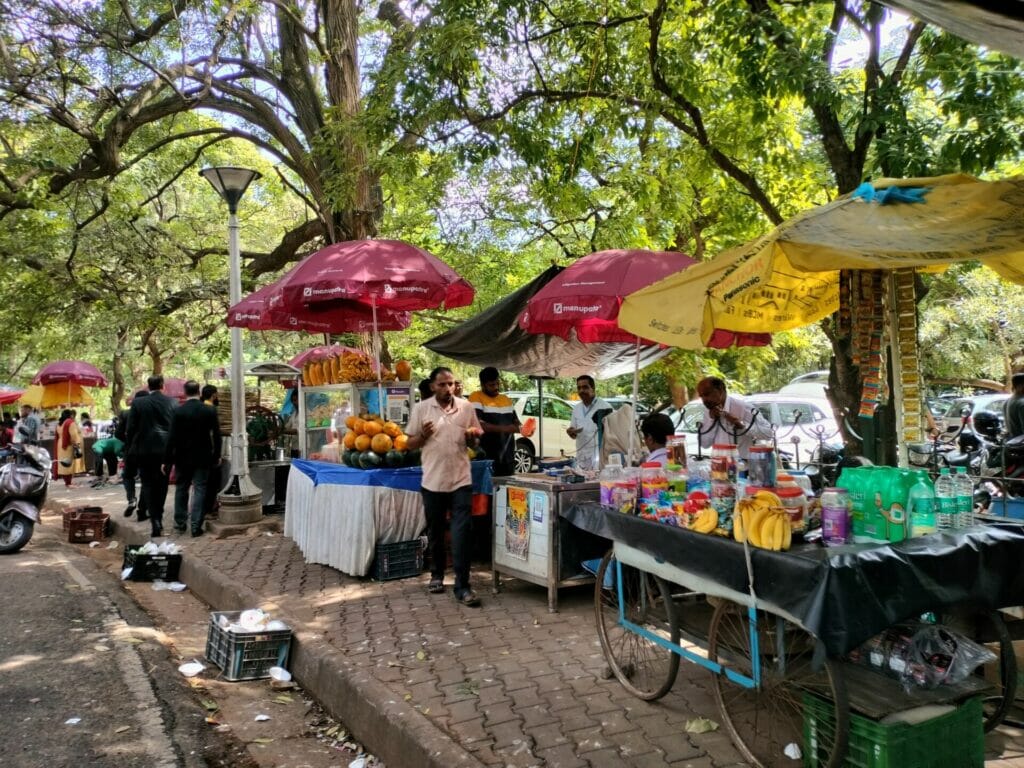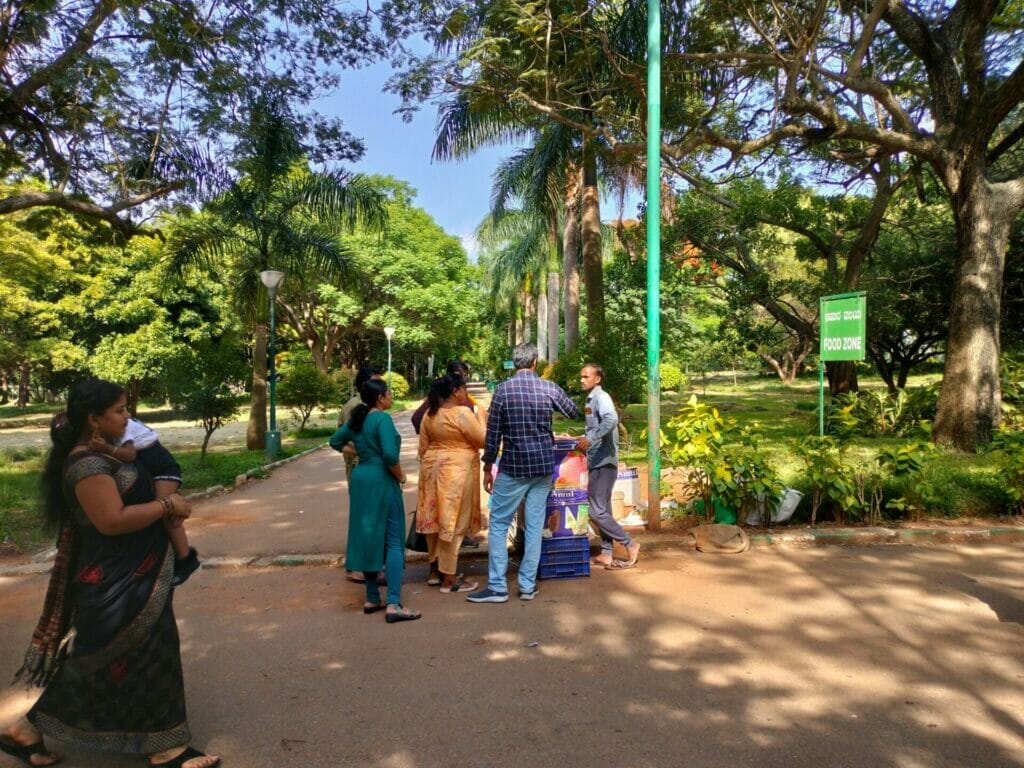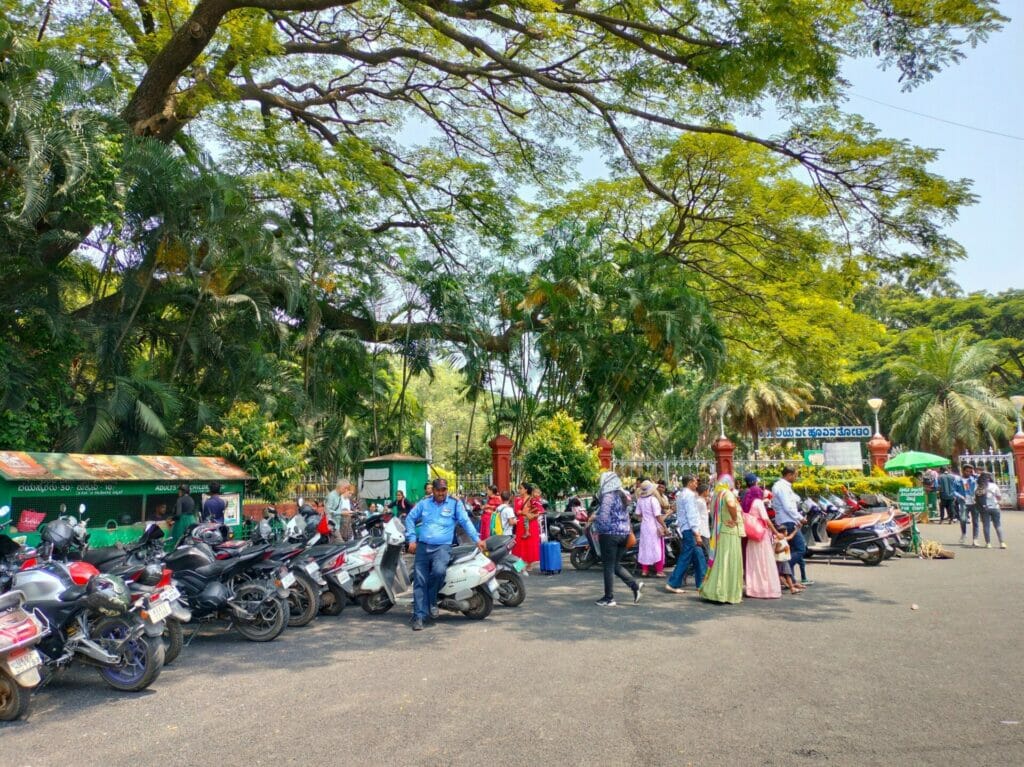Vinod Jacob, member of We Love Cubbon Park Association, expresses his concerns over the redesigning of the park. “They are now trying to lay tiles and concrete slabs. All that we’re asking for is to preserve the park in its natural form, otherwise we won’t be able to differentiate Cubbon Park from UB city.”
Vinod is not alone in his concerns over the mismanagement and concretising of Bengaluru’s parks. The Lalbagh Walkers’ Association has flagged issues over allowing vendors in the park, feeding of stray dogs and pigeons, plastic waste, sewage in Lalbagh pond, among other concerns.
Ever since the new rules came into effect in Cubbon Park, issues of accessibility and mismanagement of parks have been brought back into focus. The first part of this series looked at whether stringent rules hamper citizens’ freedom or if they are necessary to protect parks. This article will explore the concerns raised by Lalbagh and Cubbon Park Walkers’ Associations and what the authorities have to say about it.
Parks are public commons, therefore, there are different perspectives on how these spaces should be maintained and managed.
The issues raised by them reflect some core mismanagement. However, on the other hand, the authorities say their only request is for civilians to be responsible and show basic civic sense.
The rules are not rigid, say walkers
Walkers’ Associations are active in preserving Cubbon Park and Lalbagh. However, most of them find the “rigid rules” imposed on Cubbon Park quite basic, while their actual concerns is about the mismanagement of these parks and its commercialisation.
“The rules, like don’t spit, don’t litter, don’t feed animals and birds, are quite basic to follow,” says Gopinath, a member of Lalbagh Walkers’ Association. Echoing similar thoughts, Sunita, a member of We Love Cubbon Park Association. adds, “The media portrayed implementing these rules in Cubbon in an exaggerated way, as most of these rules existed before and made a little stringent post COVID. The petitions seem exaggerated too, since it was only in initially that guards used megaphones to spread awareness about the recent rules.”
The Karnataka Horticulture Department implemented a new set of rules in Cubbon Park in April 2023, which included no PDA, no food inside and no playing inside the park premises. While some people said this is moral policing and expressed disappointment, others considered these as basic ethics that must be followed in public spaces. Additionally, the concerns expressed by members of both the Walkers’ Associations shifts the spotlight elsewhere altogether.
Read more: A tale of three parks
Walkers’ Associations complaints
Some of the common issues raised with regard to Cubbon Park and Lalbagh are unrestrained littering, feeding of dogs and pigeons, improper management of water bodies, and street vendors in parks.
Though plastic is strictly banned at the entrances of all four gates in Lalbagh, a few walkers claim that littering takes place due to the vendors, who have stalls inside the park. Whereas at Cubbon Park, there is no stringent plastic regulation at the entrances, and the vendors put up their stalls only at the gates. “There are no separate bins for vendors near the gate, and they have to dump their waste in the same bins as used by the park cleaners, which results in overflow of garbage,” says Sunita.

Feeding pigeons and dogs have been prohibited in both parks. However, visitors continue to feed them. Walkers fear that irregular feeding of dogs will lead to aggressive behaviour and they might attack people. They also believe that feeding pigeons leads to health hazards, and should be stopped. “The feeders have a sense of entitlement because of which they gang up when we stop them from feeding the dogs and pigeons,” says Hemanth, a walker from Lalbagh.
Highlighting the improper management of water bodies in Cubbon Park, Vinod says: “The park has a few ponds, which are poorly managed, as there are plastic bottles dumped near them all the time. Additionally, due to the lack of regular cleaning, there is algae in the water. There is a sewage treatment plant near Kanteerava Stadium, however sometimes the sewage water overflows inside the park and spreads a foul smell.”
Hemanth raises issues about sewage water in Lalbagh pond. “Long time back, sewage water used to enter the park, and the authorities have now told us that it has been stopped. However, early mornings one can see sewage water flowing into the lake.”
“The street vendors near Bal Bhavan crowd the area and obstruct the entrance to the Cubbon,” says Sunita. Commenting along the same lines, Ramkumar from Lalbagh adds, “Many regulars are in alignment with removing the illegal street vendors from inside Lalbagh as we want this space for relaxation alone, not for it to be commercialised.”
Street vendors’ plight
The Street Vendors (Protection of Livelihood and Regulation of Street Vending) Act, 2014 guarantees protection of livelihood rights of street vendors. However, the incomplete implementation of the law has put the vendors at Lalbagh and Cubbon in a difficult situation. “Vendors can put up their stalls in any place as per the law, even without the permit. However, for security reasons, the government conducted a survey in 2017 to identify the street vendors and issue identity cards.” says Babu. S, President of the Bengaluru Jilla Beedhi Vyapari Sanghatanegala Okkuta.
He adds that the last survey was conducted in 2017, and the issued identity cards have lapsed in February 2023. Renewal of the identity cards has been requested, however, neither renewal nor a survey has been conducted. The lack of clarity in the implementation of the law puts the livelihoods of street vendors near Cubbon and in Lalbagh at risk, as theoretically, they end up being considered ‘illegal,’ though they have rights to put up their stalls.

“There is a lot of garbage that is being discarded near these stalls,” claims Hemanth about the vendors in Lalbagh. In response to this allegation, Mohan, a street vendor inside Lalbagh says, “We have to keep the premises of our stall and the vicinity where we put it up clean, otherwise the Horticulture Department will remove our stall for 15 days as punishment and we have to get our permit from the Deputy Director all over again post that.”
Steps taken by street vendors
The street vendors inside Lalbagh sell mostly fruits in biodegradable bowls, and juices in tins and glass bottles to avoid using plastic. There are nearly 30 stalls placed at different locations inside Lalbagh, where they are constantly monitored by the authorities for cleanliness. “All the stalls inside Lalbagh have been around since our grandparents’ times, and we don’t have a written permit from anyone. But we’re allowed to make a small business here without paying commission to anyone, on just a few conditions. We are asked to keep our premises of the stall clean at any cost. We have to discard our waste in the truck that comes every evening. Whatever we bring inside the park we have to wrap it properly,” says Pavan, one of the street vendors in Lalbagh.
The vendors are not allowed inside Cubbon Park, but since they have been around for more than a decade now, they are allowed to stay near the park entrances. “We only request them to not block the entrance and not litter,” says Venugopal, one of the security in charge at Cubbon Park. “We’ve put up our stall here for nearly 40 years now without complaints and so have these nearby stalls,” affirms one of the street vendors outside Cubbon.
“We have a garbage bag for ice-cream wrappers. We remove the wrapper before giving it to the customers. If they cannot properly discard one ice cream stick wrapper, would that be our fault?” asks Mohan.
What the authorities say
The Horticulture department is not permitted to issue any licensing to the vendors in and around the parks. However, authorities from both the parks have not asked the vendors to vacate as these stalls have been around for more than two decades. The Deputy Director at Lalbagh issues regulations to the vendors inside to ensure cleanliness and hygiene at these stalls.
The permission to levy fines for littering inside the parks is still under discussion, as per Balakrishna, Deputy Director at Cubbon Horticulture Department. With regard to the management of water bodies, both the authorities claim that there is constant cleaning and no sewage water overflows into these bodies; whose claims are true remains unanswered.
While Balakrishna, DD at Cubbon assures there are no stray dogs inside the park, Lalbagh Joint Director, Satish says, “As per the Animal Welfare Act, we cannot remove these dogs. Hence, we make sure they are neutered. The new puppies are transported to animal care centers by the BBMP. However, we have instructed the guards to strictly prohibit anyone from feeding dogs and pigeons.” The same was reaffirmed by Eshwarappa and Lokesh, sweepers at Lalbagh.
Commercialising parks
While the basic management of these parks are still under question, the walkers believe the authorities are trying to commercialise the space. “The manner in which Cubbon Park is being landscaped and over engineered is indicative of an effort to commodify and corporatise this most important commons of Bengaluru. Of late the Horticulture Directorate has unilaterally, and without any public discussion, imposed behavioral restrictions- such as no playing or picnics. It’s reflective of a fascist mindset where all aspects of public behaviour are controlled and trained per a diktat from the state,” says Leo Saldanha, Coordinator of Environment Support Group (ESG).

“We have requested the project members of Smart City for a change of benches in Cubbon, which are broken, but those are yet to be replaced,” complains Sunita. She adds that the natural grass at Cubbon has been replaced by Buffalo grass for aesthetics. Excessive care is given to nurseries, which grow shrubberies and foliage, that are sent to Vidhana Soudha and High Court, and very little attention is paid to the rest of the park. “Whenever we raise a concern, fund crunch is the only response we hear from the authorities, while we continue to see them lay concrete in the park,” she adds.
“We’re losing the essence of Lalbagh, due to commercialisation and this place has to be preserved for future generations,” says Ramkumar, a walker in Cubbon.
“As the city expands, and millions more look for open spaces to destress, the Government must step up and make the park, and every park, more inclusive – for children, senior citizens, the differently abled, LGBTQIA+ community, for minorities, and just about anyone. It is not a park exclusive to walkers, or tennis players or Century clubbers,” says Leo.
Basic responsibility of ensuring parks are not littered and are protected comes down to the people, irrespective of rules. While on the other hand, the authorities must focus more on preserving the lung spaces, and not commercialise them, we must admit that Bengaluru is not a Garden City anymore, and will further deteriorate if these spaces are not properly maintained.